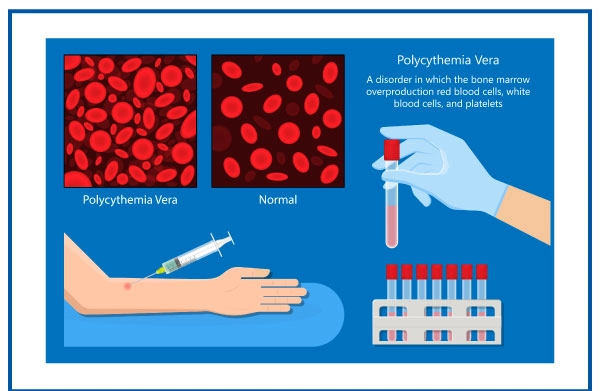What is Polycythemia?
Polycythemia vera is a form of blood disorder, known as myeloproliferative neoplasm (MPN). It causes your bone marrow to produce an abnormally high amount of red blood cells. These extra cells cause thickening of the blood, delaying its flow and even causing major complications like blood clots.
Polycythemia vera is uncommon. It normally develops gradually, and you may have it for years without realising it. Often, the problem is discovered through a routine blood test.

Symptoms
Many persons who have polycythemia vera show no symptoms or indicators. Some people experience vague symptoms like headaches, dizziness, lethargy, and blurred vision. More specific polycythemia vera symptoms include:
Dry gangrene:
- Itching, particularly after a hot water bath or shower
- Hand, foot, arm, or tingling, burning, leg numbness, or weakness
- A feeling of fullness shortly after eating, as well as bloating
- Left upper abdominal pain may indicate an enlarged spleen.
- Bleeding that is unusual, such as a nosebleed or bleeding gums.
- Painful swelling of a single joint, usually the big toe.
- When lying down, you may experience shortness of breath.
- Blood clots in limbs, brain and heart.
Causes
Polycythemia vera develops when a gene mutation causes difficulty with blood cell development. Your body normally regulates the number of the three types of blood cells: white blood cells, red blood cells, and platelets. However, in polycythemia, the bone marrow produces an excessively high volume of some of these blood cells.
The cause of the polycythemia vera gene mutation is unknown, although it is not usually transmitted from your parents.
Risk elements
Polycythemia vera can strike at any age, but it is most frequent in adults aged 50 to 70. Men are more likely than women to get polycythemia vera, while women develop the disease at a younger age.
Complications
Polycythemia vera can lead to the following complications:
Blood clots:
The blood thickness increases, blood flow decreases, and platelet abnormalities increase the risk of blood clots formation. Blood clots can cause a heart attack, stroke, or a blockage in a pulmonary artery or a vein deep within a thigh muscle or the belly.
Spleen enlargement:
The spleen helps your body in fighting infection and filtering unwanted materials such as old or broken blood cells. Because of the increased quantity of blood cells caused by polycythemia vera, your spleen works harder than usual, causing it to grow.
High amounts of red blood cells cause problems:
Too many red blood cells can cause a variety of additional problems such as open sores on the internal stomach lining, upper small intestine, or esophagus (peptic ulcers) and joint inflammation (gout).
Other types of blood diseases:
Polycythemia vera can lead to other blood illnesses, such as bone marrow scar tissue, a condition in which stem cells do not mature or function normally, or blood and bone marrow cancer (acute leukemia).
Diagnosis and treatment
Your doctor will take a thorough medical history and conduct a physical examination.
Examinations of the blood
Blood testing may reveal the following if you have polycythemia vera:
- There are more red blood cells than usual and an increase in platelets or white blood cells.
- A higher proportion of red blood cells in total blood volume (hematocrit measurement)
- Increased quantities of the iron-rich protein that transports oxygen in red blood cells (hemoglobin).
Biopsy or bone marrow aspiration
If your doctor suspects you have polycythemia vera, they may propose a biopsy or bone marrow aspiration to acquire a sample of your bone marrow.
A bone marrow biopsy involves the collection of a sample of solid bone marrow, whereas bone marrow aspiration is frequently performed concurrently. During an aspiration, your doctor samples your marrow's liquid part.
Polycythemia vera has no known treatment. The treatment focuses on lowering your chances of problems, and these remedies may help alleviate your discomfort.
